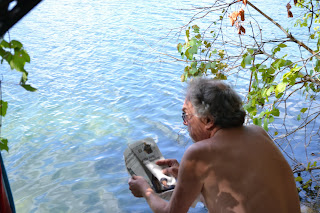Roy and I were advised to add a wardrobe or armoire to our second bedroom in order to make the Wayland house more attractive for sale. After much hemming and hawing, internet window shopping, and visits to almost every kind of furniture store, we bought Lowe's "better" quality wardrobe kit.
In one word: DON'T.
It was difficult to put together. Some parts were not labeled. Others were not as pictured. Because of the weight of the composite boards, we added wood glue to beef up the performance of the small pegs and screws provided. We let the basic shell dry, or thought we left it alone long enough to dry. But when we stood it upright, the WHOLE THING collapsed like a house of cards.
 |
| Phase One, when the project was merely difficult. |
I don't have a picture of The Fall, but I can assure you it was spectacular.
Such an event tests the mettle of a handyman. Roy passed. I would have stuffed the whole mess into the trunk of the Civic and returned it to Lowe's. Instead, we laboriously rebuilt the cabinet, adding longer screws in between those provided. We let it dry much longer, then gingerly lifted it upright. No fall. Even so, we jammed it between the wall and another piece of furniture for the night, as it still swayed sideways.
Next day we bought a piece of Masonite-type material at The Home Depot and nailed on a backing. No way were we going to trust the cardboard backing from the kit. Stabilized, the wardrobe stood fairly still to receive its doors and shelves. We held our breaths while Roy fitted the doors into their hinges. With a few clever twirls of a screwdriver, Roy closed the gap between the closed doors.
Victoire!
 |
Electric tools speed progress,
but they can also speed regress! |
This piece of furniture looks quite bland, even innocent.
Roy and I know better, and so do you.
 |
| Handyman victorious. |
If you are the lucky person to buy our Wayland house, please treasure this closet. It challenged the endurance and emotional stability of a handyman and helper, and they triumphed.




















































